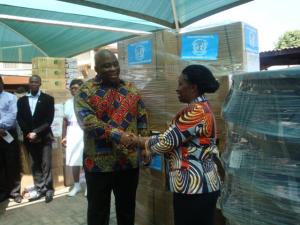WHO Ghana donates emergency medical supplies to Ministry of Health to respond to major flooding
Accra, 19 June 2015 - In response to heavy rains and flooding, the World Health Organization has donated about 5 tons of essential medical supplies to treat severe and moderate cases of diarrhoea and cholera worth nearly US$100,000 to the Ministry of Health. The consignment consists of three Interagency Diarrhoeal Disease Kits containing enough medicines and equipment such as oral rehydration salts (ORS), intravenous fluids and medical equipment to treat over 2,000 episodes of severe and moderate diarrhoea.
Torrential rains on Wednesday, 3 June caused extensive damage to buildings and roads, including the explosion of a gas station in the Accra Metropolis area. According to the National Disaster Management Organisation’s (NADMO) preliminary assessments, approximately 9,250 people have been affected and 155 deaths due to the flooding and gas station explosion.
WHO Country Representative to Ghana Dr Magda Robalo said, “We are deeply saddened by the loss of life caused by the recent floods. With more rains expected, we are concerned about the increasing risk of diseases, such as cholera and malaria. Whilst, this donation is aimed at providing immediate life-saving needs, the greatest defence against disease is regular hand washing with soap and running water, drinking safe clean water by boiling it and ensuring food is properly cooked and lactating mothers encouraged to exclusive breastfeed their infants.”
In his response, the Deputy Minister of Health, Dr Victor Bampoe, thanked WHO for the supplies and also for the all the support to the Ministry of Health and its Agencies. He was optimistic that WHO will continue to provide support to the Health Sector.
In order to prepare and respond to cholera, WHO has provided technical advice and support for cholera control and prevention by training health professionals at national and regional levels in order to prevent, prepare and respond to disease outbreaks. Additionally, WHO has disseminated information, education and communication (IEC) materials and guidelines on cholera and other epidemic-prone enteric diseases to health professionals and the general public.
In 2014, Ghana witnessed the worst cholera outbreak in history. From June to December 2014, a total of 28,975 cases with 243 deaths (CFR of 0.8%) were reported from 130 out of the 216 districts in all the 10 regions of the country. Whilst final figures for 2015 are being validated, hundreds of cholera cases have been reported.
_________________________________________________
For additional information, please contact:
Technical Contact:
Dr Magda Robalo; Tel +233 302-763918 Email: robalom [at] who.int (robalom[at]who[dot]int)
Dr Sally-Ann Ohene: Tel+233 544316021 Email: ohenes [at] who.int (ohenes[at]who[dot]int)
Media Contact:
Ms Joana Ansong: Tel: +233 544316017 Email: ansongj [at] who.int (ansongj[at]who[dot]int)



